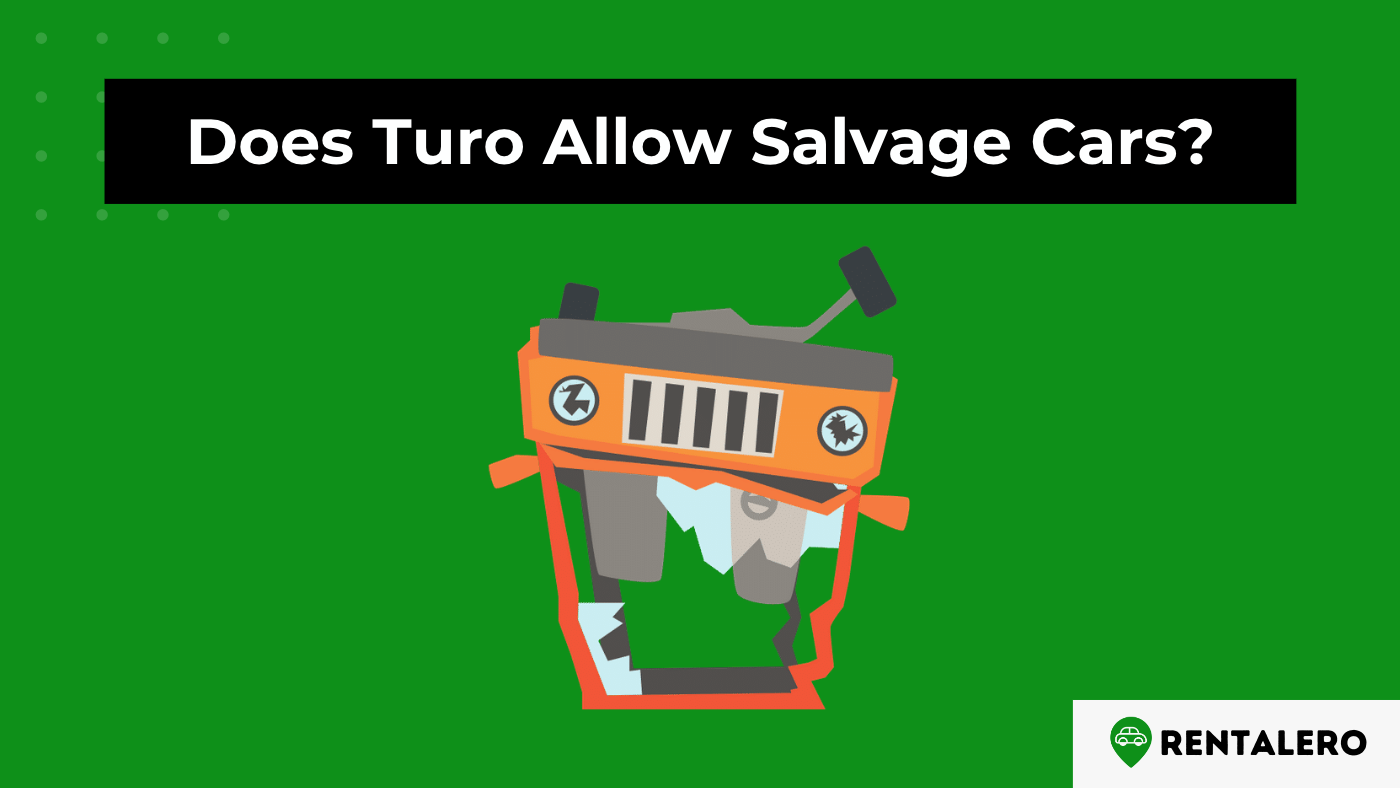Are you considering listing your car on Turo but unsure whether your salvage vehicle is allowed on the platform?
As a peer-to-peer car rental service, Turo provides car owners an excellent opportunity to earn extra income by renting out their vehicles. However, the question now is: Does Turo allow salvage cars?
In this article, we’ll address this question and provide insights into Turo’s policies, so you can make an informed decision about listing your salvage car on the platform.
Advertising links are marked with *. We receive a small commission on sales, nothing changes for you.
Key Takeaways
- Turo explicitly prohibits listing salvage title cars on their platform due to safety concerns and insurance implications.
- Salvage cars have potential benefits like cost-effectiveness and restoration opportunities but drawbacks like safety concerns, insurance challenges, and resale difficulties.
- Alternatives to salvage cars for Turo include used cars with clean titles, economy cars, and unique or luxury cars.
- To choose the right car for Turo, consider your local market, inspect the car before purchase, factor in all associated costs, and ensure the car meets Turo’s eligibility criteria.
- Although salvage cars can be tempting due to their lower upfront cost, they are not suitable for Turo, and you should explore alternative options that comply with the platform’s policies.
Turo’s vehicle eligibility criteria
Every platform has rules, and Turo is no different. To ensure safety and quality, Turo has specific requirements that your car must meet:
- It must be no more than 12 years old (though some exceptions apply).
- It should have less than 130,000 miles on the odometer.
- It needs to be in good condition with no cosmetic damage.
- It must have a fair market value of up to $150,000.
- It has to be legally registered (but not necessarily in your name).
- It can’t be a reconstructed or salvaged vehicle.
Understanding salvage cars
The term “salvage car” can sound a bit ominous, but what does it mean?
A salvage title car is a vehicle that has been severely damaged (usually in an accident) to the point where the cost of repairs exceeds a significant percentage of its pre-damage value.
This percentage varies by state, but it’s typically around 75%. The insurance company declares it a total loss, giving the vehicle a salvage title.
Salvage cars can be repaired and, if they pass a state inspection, can be legally driven again. However, they will always carry the “salvage” designation, which can affect their resale value and insurability.
Turo’s Policy on Salvage Cars
First things first, let’s address the elephant in the room. Unfortunately for some, Turo doesn’t allow cars with a salvage, reconstructed, or branded title. This policy is clearly outlined in their vehicle eligibility criteria.
Unfortunately, even if you’ve lovingly restored a salvage car and it’s in perfect running order, it can’t be listed on Turo.
Reasons behind Turo’s policy
Safety
Turo wants to ensure that all cars on the platform are safe to drive. Unfortunately, while many salvage cars can be repaired safely, Turo has no way of verifying the quality of these repairs. Therefore, they err on the side of caution.
Insurance
Turo provides insurance for all vehicles during the rental period. However, many insurance companies hesitate to cover salvage cars due to their history.
Customer Experience
Turo aims to provide a reliable and seamless experience for renters. Salvage cars, although repaired, could potentially have more mechanical issues than a typical used car.
Risks and Concerns with Salvage Cars
While salvage cars can offer great value for money, they come with their fair share of risks and concerns.
Safety concerns for salvage cars
The extent of the damage on a salvage car can vary greatly – it could be anything from flood damage to a serious collision. While many of these cars can be repaired, some damage may not be fully fixable, leading to potential safety hazards. For example, if a car’s frame was bent in an accident, it could be weakened even after repair, potentially putting you at risk in another collision.
Insurance implications for salvage cars
Insurance companies typically view salvage cars as high risk. As a result, some companies may refuse to provide comprehensive coverage, and those that do often charge higher premiums. Moreover, most insurance companies will only pay 80% of a salvage car’s market value if you’re in an accident.
Value depreciation of salvage cars
Salvage cars tend to depreciate faster than their clean-title counterparts. This is largely due to their branded title, which can scare potential buyers. So, while a salvage car may be cheaper upfront, it might also not hold its value in the long run.
While salvage cars can seem like a bargain, these risks mean they may not be the best choice for everyone. And when it comes to Turo, they’re a no-go.
The Pros and Cons of Using Salvage Cars
If you’re considering using a salvage car, it’s vital to understand both the potential benefits and drawbacks.
Pros
Cost-Effectiveness
Salvage cars can be significantly cheaper than their counterparts with clean titles. This makes them a tempting choice for those looking to save money upfront.
Parts Resale
Even if the car isn’t drivable, it may have parts in good condition and can be sold separately. This is often a viable option for mechanics or car part resellers.
Cons
Safety Concerns
The biggest concern with salvage cars is safety. These vehicles were written off for a reason, and while some might be repairable, others could have hidden damage that makes them unsafe to drive.
Insurance Challenges
Many insurance companies are hesitant to cover salvage cars or will only offer limited coverage. Unfortunately, this could leave you vulnerable to significant financial risk in an accident.
Resale Difficulties
A car with a salvage title can be challenging to sell. As a result, many buyers are wary of salvage cars due to the potential risks and insurance difficulties.
Alternatives to Using Salvage Cars on Turo
If you’re interested in sharing a car on Turo but have learned that your salvage car won’t make the cut, don’t worry—there are other options.
Recommendations for Other Types of Cars to Use on Turo
Used Cars with Clean Titles
A used car with a clean title can be an excellent choice for Turo. They’re typically more affordable than new cars and can be listed on the platform if they meet Turo’s eligibility criteria.
Economy Cars
Vehicles with high fuel efficiency and low maintenance costs, such as economy cars, can be a great choice. As a result, they’re typically in high demand from renters looking to save on gas.
Unique or luxury cars
If you’re willing to invest more, unique or luxury cars can command higher rental prices on Turo. However, these vehicles may also have higher maintenance and insurance costs.
Tips for Sourcing and Choosing Cars for Turo
Consider your market
Research your local market to understand what types of vehicles are in high demand. This could influence your decision on what kind of car to invest in.
Inspect before you buy.
Whether buying a new or used car, always have it inspected by a trusted mechanic before purchasing. This can help you avoid unexpected repair costs down the line.
Factor in costs.
Remember to factor in all costs, including maintenance, insurance, and potential downtime between rentals. These costs can significantly impact your returns.
Understand Turo’s criteria
Familiarize yourself with Turo’s vehicle eligibility criteria before purchasing a vehicle for the platform.
Conclusion
As we wrap up this exploration into Turo’s policy on salvage cars, it’s clear that while these vehicles may seem tempting due to their lower upfront costs, their inherent risks and challenges make them a no-go for Turo.
Remember, Turo’s ultimate goal is to provide a safe, reliable, and enjoyable experience for both hosts and renters. So if you’re considering listing your car on Turo, adhering to their guidelines and understanding their policies is important.
The takeaway here isn’t that salvage cars are inherently bad or unusable. On the contrary, they can provide good value in the right circumstances. However, it’s crucial to consider the cost, safety, reliability, and customer experience when it comes to sharing platforms like Turo.
Frequently Asked Questions
Can I list a salvage car on Turo if it’s been professionally repaired?
No, Turo’s policy explicitly states that cars with a salvage, reconstructed, or branded title are not allowed on the platform, regardless of the quality of repairs.
What types of cars are eligible to be listed on Turo?
Turo has a comprehensive list of eligibility criteria, which includes having a clean (non-salvage) title, being less than 12 years old, having fewer than 130,000 miles, and meeting safety and condition requirements.
What alternatives do I have if I can’t list my salvage car on Turo?
If you have a salvage car, you’d like to monetize; you could consider selling it or using it for parts. Alternatively, if you’re interested in car sharing, you might consider investing in a used car with a clean title to list on Turo.

Nzoputa has been writing for Rentalero since day one and is one of our most experienced members when it comes to the rental industry. For her, nothing beats Uber!
Advertising links are marked with *. We receive a small commission on sales, nothing changes for you.

